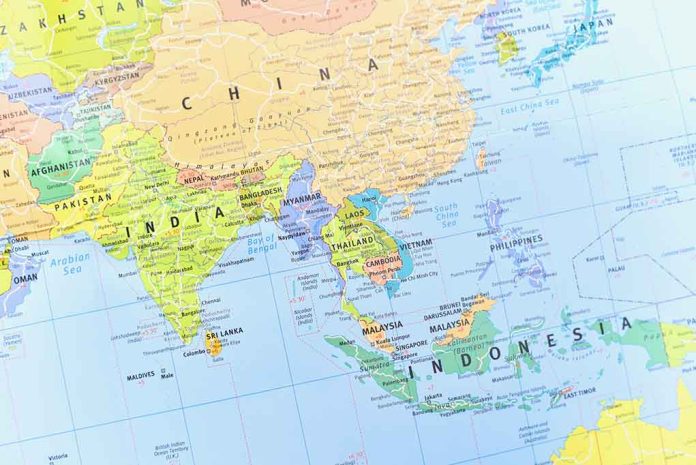
Pakistan suspends decades-old peace treaty with India while warning of “tit-for-tat” military retaliation over Kashmir massacre, bringing the nuclear-armed neighbors to the brink of war.
Key Takeaways
- Pakistan has suspended the 1972 Shimla peace accord with India following escalating tensions over a deadly attack on Indian tourists in Kashmir.
- India suspended the crucial Indus Waters Treaty that controls river flows to Pakistan, which Pakistani officials are calling “an act of war.”
- Both nuclear powers have closed borders, cancelled visas, expelled diplomats, and issued military threats, creating the most dangerous standoff in decades.
- Pakistan has closed its airspace to Indian aircraft and warned of “full force” retaliation to any water diversion during critical agricultural sowing season.
- The crisis threatens regional stability as accusations of state-sponsored terrorism fly between the longtime rivals.
Nuclear-Armed Rivals on the Brink
India and Pakistan, longtime enemies possessing nuclear arsenals, are careening toward potential military confrontation following the massacre of Indian tourists in Kashmir. The attack in Pahalgam, described as the deadliest assault on civilians in the disputed territory since 2000, has triggered a rapid deterioration in already fragile relations. India’s Prime Minister Narendra Modi has publicly vowed retribution, while Pakistan has implemented sweeping diplomatic and economic measures against its neighbor. The speed at which these nations have dismantled decades of peace agreements suggests the seriousness of the current crisis.
Pakistani authorities have expelled Indian diplomatic officials, cancelled visas for Indian nationals, and shuttered borders to trade and travel. Most alarming to security analysts is Pakistan’s suspension of the Shimla Agreement, a foundational peace treaty signed in 1972 that had established principles for bilateral relations following the Bangladesh Liberation War. The dismantling of this diplomatic cornerstone signals Pakistan’s willingness to abandon the framework that has helped prevent full-scale war for over fifty years.
⚡️⚡️⚡️BREAKING: Tensions Between India and Pakistan Escalating Rapidly
On April 22, armed men attacked tourists in the Indian-controlled region of Kashmir, killing 26 people. India vowed to pursue those responsible and stated that the terrorists came from Pakistan.
Since then,… pic.twitter.com/FE7gsvEcVz
— NEXTA (@nexta_tv) April 24, 2025
Water as a Weapon: The Indus Treaty Crisis
India’s suspension of the Indus Waters Treaty represents perhaps the most dangerous escalation in the current standoff. This 1960 agreement, brokered by the World Bank, has survived three wars between the nations by guaranteeing Pakistan’s access to vital water resources. Even during previous conflicts, neither country dared tamper with this agreement due to its critical importance for Pakistan’s agriculture, power generation, and domestic water supply. Now, India has taken the unprecedented step of threatening this lifeline during Pakistan’s agricultural sowing season.
“Any attempt to stop or divert the flow of water belonging to Pakistan as per the Indus Waters Treaty … will be considered as an act of war and responded [to] with full force across the complete spectrum of national power,” Pakistan’s National Security Committee warned in an official statement.
The timing of India’s decision appears calculated to maximize pressure on Pakistan, which depends on the Indus waters for critical irrigation during planting seasons. The treaty governs the distribution of water from six rivers that flow from India into Pakistan. Without this agreement, India could potentially divert significant water resources, devastating Pakistan’s agricultural sector and economy at a time when the country is already facing significant economic challenges.
Pakistan to suspend peace treaty with India as tensions grow over Kashmir killings via @FT
https://t.co/fqtzlT13vD— John Reed (@JohnReedwrites) April 24, 2025
Terrorism Accusations and Kashmir’s Bloody History
The crisis erupted after gunmen killed Indian tourists in Pahalgam, a popular destination in the Indian-administered portion of Kashmir. Indian authorities quickly blamed Pakistan for supporting “cross-border terrorism,” naming three suspected militants, two of whom they claim are Pakistani nationals. Kashmir has been a disputed territory ever since the 1947 partition that created both nations, with both sides claiming the entire region and controlling different portions. The area has been the flashpoint for multiple wars and continues to be heavily militarized.
“I say to the whole world, India will identify, track and punish every terrorist and their backers,” declared Indian Prime Minister Narendra Modi, signaling his government’s intention to take potentially military action against those responsible.
Pakistan vehemently denies involvement in the attack and has countered with accusations that India supports terrorism within Pakistani territory. Pakistani Foreign Minister Ishaq Dar has promised swift retaliation against any Indian military action, stating: “There will be a tit-for-tat reply, and not an iota less than they have done.” This rhetoric, coupled with Pakistan’s Prime Minister’s office declaring that threats to Pakistani sovereignty “will be met with firm reciprocal measures in all domains,” indicates both nations are prepared for military escalation.
Biden Administration Silent as Regional Stability Threatened
The Biden administration’s conspicuous silence on this dangerous escalation between nuclear powers represents yet another foreign policy failure. While the White House focuses on funding Ukraine’s war and pushing progressive social agendas at home, two nuclear-armed countries with a combined population of over 1.5 billion people are dismantling peace agreements and threatening military action. The potential for catastrophic regional instability appears to be of little concern to an administration that has consistently projected weakness on the world stage.
Diplomatic relations between India and Pakistan were already severely strained after India revoked Kashmir’s semi-autonomous status in 2019, a move that outraged Pakistan. Both countries have reduced diplomatic representation in each other’s capitals and have minimal commercial ties. The latest crisis has eliminated what little diplomatic channels remained, making de-escalation particularly challenging. Without international intervention, the situation could rapidly deteriorate into open conflict with devastating consequences for South Asian stability.




